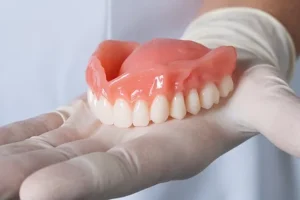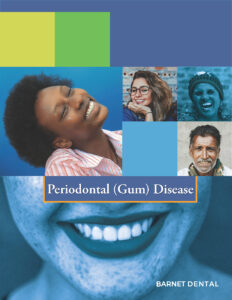What is it?
Dentures, also known as false teeth, are removable dental appliances designed to replace missing teeth and restore oral function, aesthetics, and facial appearance. They are custom-made to fit comfortably and securely in the mouth, providing support for the lips and cheeks and allowing individuals to chew, speak, and smile with confidence. Here’s an overview of dentures and their key aspects:
- Purpose of Dentures:
- Dentures are used to replace missing teeth in individuals who have lost some or all of their natural teeth due to various factors, including tooth decay, gum disease, trauma, or age-related tooth loss.
- By replacing missing teeth, dentures help restore proper chewing and speaking abilities, improve facial aesthetics and symmetry, prevent sagging of the facial muscles, and enhance overall oral health and quality of life.
- Types of Dentures:
- Complete Dentures: Also known as full dentures, complete dentures are used to replace all of the teeth in the upper or lower jaw (or both jaws). They consist of a flesh-colored acrylic base that supports a complete set of artificial teeth designed to resemble natural teeth. Complete dentures are held in place by suction or denture adhesive and are removable for cleaning and maintenance.
- Partial Dentures: Partial dentures are used when some natural teeth remain in the mouth. They consist of a metal or acrylic framework that attaches to the remaining natural teeth using clasps or precision attachments. Artificial teeth are mounted on the framework to fill in the gaps created by missing teeth, restoring function and aesthetics.
- Implant-Supported Dentures: Implant-supported dentures are removable overdentures that are anchored in place by dental implants surgically placed in the jawbone. These dentures offer increased stability, retention, and chewing efficiency compared to traditional dentures, as they are securely attached to the implants and do not rely solely on the gums for support.
- Fabrication Process:
- The process of getting dentures typically involves several appointments with a dentist or prosthodontist (a specialist in restorative dentistry) to custom-design and fabricate the dentures to meet the individual’s unique needs and preferences.
- During the initial consultation, the dentist will perform a comprehensive examination of the oral cavity, including impressions, measurements, and photographs of the teeth and surrounding structures.
- Based on these records, the dentist will create a treatment plan and fabricate a set of custom-made dentures that closely resemble the shape, size, and color of the natural teeth and gums.
- Once the dentures are fabricated, they are adjusted and fitted to ensure optimal comfort, function, and aesthetics. Additional adjustments may be made as needed to achieve the desired fit and appearance.
- Care and Maintenance:
- Proper care and maintenance are essential for prolonging the lifespan of dentures and ensuring optimal oral health:
- Daily Cleaning: Dentures should be cleaned daily using a soft-bristled brush and mild denture cleaner or soap. Avoid using abrasive cleaners or toothpaste, as they can damage the denture material.
- Overnight Soaking: Dentures should be soaked in a denture cleaning solution or water overnight to keep them moist and prevent them from drying out.
- Regular Check-Ups: Regular dental check-ups are important for monitoring the fit and condition of dentures, as well as for detecting any signs of irritation, infection, or changes in oral health.
- Denture Adhesives: Denture adhesives may be used to enhance the stability and retention of dentures, particularly for individuals with loose-fitting dentures or diminished jawbone support.
- Adjustment Period:
- It may take some time to adjust to wearing new dentures, especially if you are transitioning from natural teeth to dentures for the first time. Common issues during the adjustment period include:
- Soreness or irritation of the gums or oral tissues.
- Difficulty speaking or chewing initially.
- Increased saliva flow or minor changes in taste.
- With time and practice, most individuals adapt to wearing dentures and experience improved comfort, function, and confidence in their appearance.
In summary, dentures are custom-made dental prostheses that provide a practical and effective solution for replacing missing teeth and restoring oral function and aesthetics. Whether complete or partial, dentures offer a versatile and affordable option for individuals seeking to regain the ability to eat, speak, and smile comfortably and confidently. With proper care, maintenance, and regular dental check-ups, dentures can provide long-lasting benefits and contribute to improved overall oral health and quality of life.

